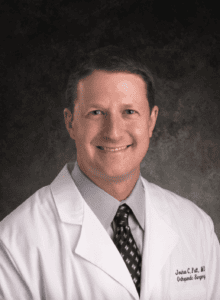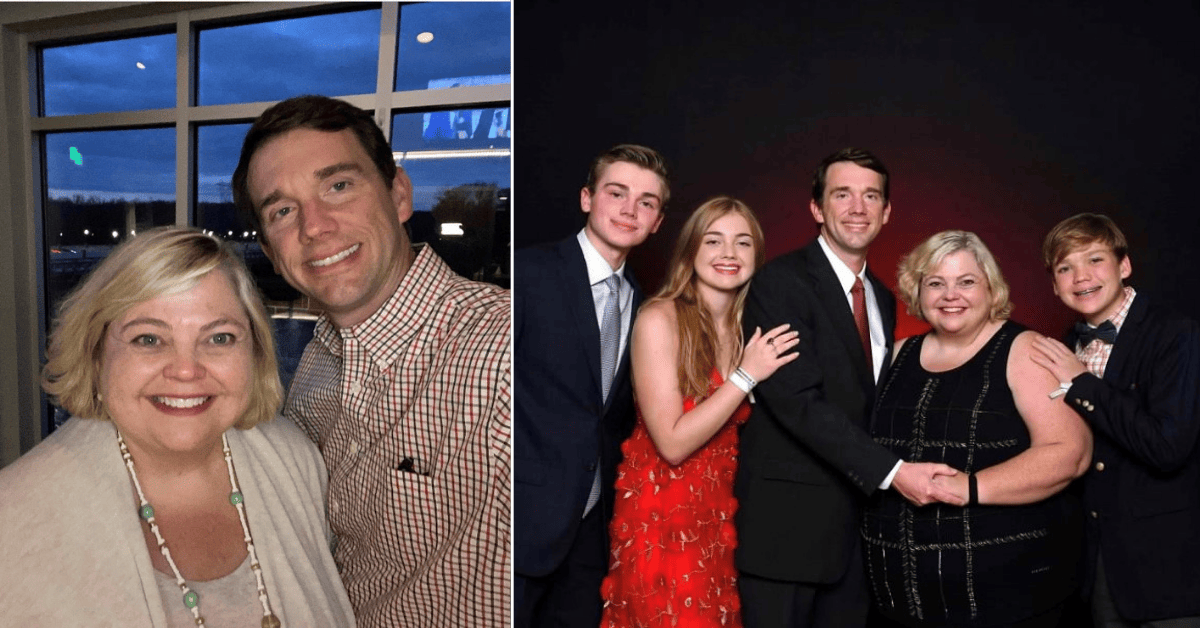In the summer of 2019, Priscilla Windsor was swimming with her two sons when she felt pain with each stroke of her right arm. Then Priscilla, 47, started struggling with basic tasks around the house, like lifting a jug of milk into the refrigerator or grabbing the laundry detergent off the shelf. She was referred to sports medicine specialist Dr. Eric Warren with Atrium Health Musculoskeletal Institute. Dr. Warren thought Priscilla had a condition called “frozen shoulder,” which is common in women in their 40s. But when six weeks of physical therapy didn’t relieve the pain, Dr. Warren sent Priscilla for an MRI, which showed a growth on her scapula, or shoulder blade.

Dr. Joshua Patt
Priscilla was referred to Dr. Joshua Patt, an orthopedic surgeon at Atrium Health Levine Cancer Institute and the vice chair of education for Atrium Health Musculoskeletal Institute, who ordered a biopsy of the mass. The diagnosis was daunting: it was a 10-centimeter malignant tumor. Dr. Patt knew he had to remove the tumor so he could determine the best treatment path for Priscilla. “It wasn’t clear whether it was a soft-tissue tumor invading into the bone, or a bone tumor extending out into the soft tissues,” shared Dr. Patt, who specializes in rare and complex sarcomas. Patients with soft-tissue sarcomas typically receive radiation, but not always chemotherapy, while those with bone sarcomas often require chemotherapy, but not radiation, so determining the tissue of origin was centrally important to providing the best treatment strategy for Priscilla.
Patients who were diagnosed with shoulder sarcomas 30 years ago typically had to undergo total arm amputations, but thanks to cutting-edge techniques developed in recent years, Dr. Patt’s team was able to remove 90% of Priscilla’s scapula and preserve her arm in a procedure known as a scapulectomy. “We were able to save some of her deltoid muscle and the tissue that attaches it to the shoulder,” Patt said. “We then reconstructed her biceps tendon, attaching it to her collar bone, to give her some elbow flexion and shoulder stabilization.” The operation, which took place in December 2019, took about six hours.
The expertise needed to perform complex sarcoma surgery is hard to find, so patients will travel from all over the southeast for the expertise of Dr. Patt and his colleagues. LCI saw almost 600 new patients for bone and soft tissue tumors last year, up from 342 in 2018, according to Dr. Patt.
Benefiting from Integrated Care
After Dr. Patt removed Priscilla’s tumor, he confirmed it was sarcoma of the bone. He assembled a team of Atrium Health physicians, who worked together to come up with an integrated treatment plan. Priscilla received six courses of the chemotherapy combination cisplatin plus adriamycin under the guidance of Dr. Michael Livingston at LCI. She also had occupational and physical therapy to maximize her use of her arm and shoulder. During her treatment, LCI provided her with access to skilled providers to help with everything from pain management to the financial aspects of her care. Physical therapist Joanna Langford continues to work with Priscilla to help manage some lingering neuropathy and balance issues.
Today, Priscilla is cancer-free, and while she doesn’t have full range of motion in her right arm, she has regained enough function to be able to perform basic tasks around the house—and to return to the pool. “The water helps me to hold my shoulder up, and then I can move my arms to swim. I enjoy swimming for exercise. Being in the water is the time I feel the most whole,” shared Priscilla, who is married and mom to a 19-year-old daughter and her sons, ages 17 and 13.
Priscilla still has some shoulder pain, but she keeps it under control with the help of massage therapy and acupuncture, and she credits psychologist Sarah Galloway, PhD, of Atrium Health Levine Cancer Institute’s Supportive Oncology Clinic, with helping her get through the tough patches, including one three-month stretch when her oncologists were watching a suspicious spot that showed up in a follow-up scan but turned out to be benign. “Getting through the anxiety of those three months, it gave me peace just to be able to talk it through,” said Priscilla.
She recently signed on to be a peer counselor to a mechanic who needed a complex surgery similar to the one she had. Priscilla provided comfort to the patient, who was frightened he might lose his ability to work. “I got on speaker phone with him and his wife and said ‘Hey, you can do this. It won’t be easy, but you have so much to live for,’” Priscilla recalled. She also shared videos of her physical therapy sessions with the patient, who ultimately decided to go ahead with the surgery in mid-April.
As for Priscilla, she undergoes follow-up scans every three months, and they continue to show no evidence of her cancer—a testament to the quality of the integrated care she received at LCI, she says. “I’m just so grateful. I’ve been given the gift of time.”

